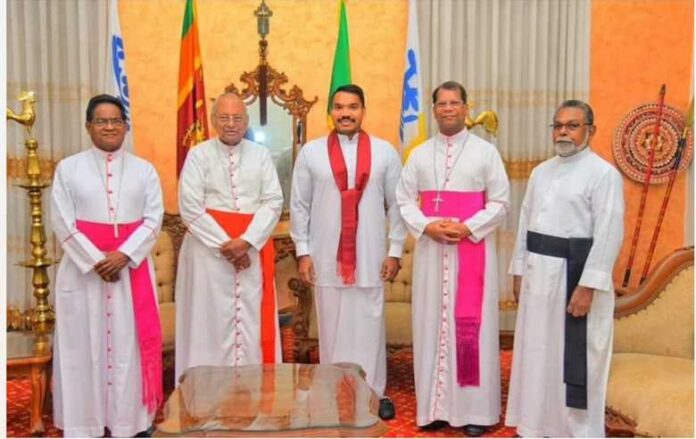By: Adolf
August 24, Colombo (LNW): Cardinal Malcolm Ranjith, the Archbishop of Colombo, is known for his outspoken and often controversial views on various social and political issues, frequently stepping beyond the conventional boundaries of religious teaching. He has taken a strong stance on matters such as the 2019 Easter Sunday bombings, consistently criticizing the government’s handling of the investigation and demanding justice for the victims.
Unlike any other Catholic Bishop in Sri Lanka’s history, Cardinal Ranjith has actively engaged in political discourse, particularly concerning national governance and social justice. He has been critical of policies that, in his view, deepen ethnic divisions or neglect marginalized communities. His public statements occasionally reflect a nationalist tone, emphasizing the protection of Sinhalese Buddhist culture, which has drawn criticism from minority groups.
The Cardinal has also expressed skepticism toward international organizations and Western influence in Sri Lanka. He has been vocal against foreign intervention in the country’s domestic affairs, especially regarding human rights investigations related to the civil war. His comments often align with nationalist rhetoric, positioning him as a defender of Sri Lankan sovereignty, though this stance has also drawn criticism from those who see international oversight as crucial for justice and accountability.
These examples illustrate how Cardinal Malcolm Ranjith’s actions and statements often extend beyond the traditional scope of religious teaching, placing him at the center of political and social controversies in Sri Lanka. Alongside figures like Fr. Cyril Gamini, he has ventured into contentious areas, sometimes rushing into dangerous or difficult situations without fully considering the consequences for the Catholic Church, acting as though he owns the institution rather than holding his position in trust.
Relationship with the Rajapaksa Family
The relationship between Cardinal Malcolm Ranjith and the Rajapaksa family is complex. There have been periods of perceived closeness, particularly during and after the civil war, as well as during the lead-up to the 2019 election, where he appeared to support Gotabaya Rajapaksa’s candidacy. However, recent years have seen a more confrontational dynamic, particularly in the aftermath of the Easter Sunday bombings and subsequent political developments in Sri Lanka. The Cardinal’s role as a moral and religious leader frequently intersects with the country’s volatile political landscape, leading to a precarious relationship with political leaders, especially the Rajapaksas.
Despite harsh public criticism of the Rajapaksas in recent years, perceptions linger that Cardinal Ranjith has maintained a certain level of closeness with the family. This perception is partly due to his relatively muted criticism of them during their periods in power and his occasional appearances alongside them at public ceremonies. However, his more recent critiques, especially in the context of the Easter bombings, have somewhat distanced him from this image. Still, it shocked many when he entertained the controversial son of Mahinda Rajapaksa, leading to ridicule on social media.
What the Cardinal may not fully grasp is that he does not own the Catholic Church; he holds his position in trust. His actions have drawn comparisons to controversial figures like Pastor Jerome, whose statements have also sparked outrage. If the Cardinal were accountable to a mortal authority, they might advise him to focus more on prayer than on political appearances. Given the way he is conducting himself, he risks ending up like the former Chief Justice of Sri Lanka, who was ousted from office by public outrage. Cardinal Ranjith should heed the Italian proverb: “He who plays with fire gets burned.”


